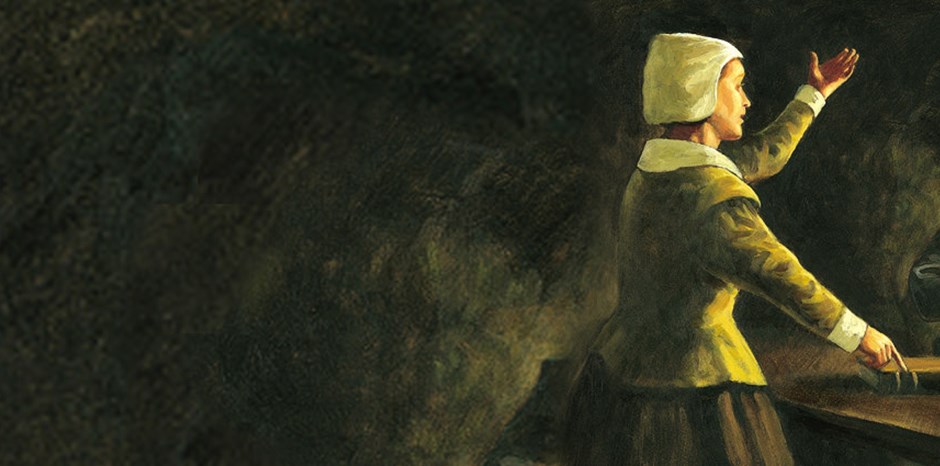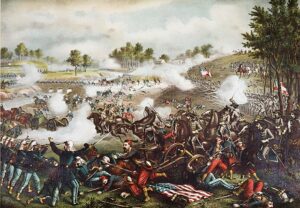For centuries women have fought against numerous injustices forced upon them because of their gender. Some of these injustices include the right to be seen as an equal to men, the right to vote, and the right for equal pay, along with many more. Although women have succeeded in breaking down some of these barriers, there are still many inequalities being fought today. During the seventeenth century, there was one woman in particular who battled in opposition to social injustice: Anne Hutchinson. This article is about the life of a brave woman who opposed an unfair law forbidding men and women from freely practicing their religion, and who also challenged the preposterous roles women were limited to in the religious community.

Anne Hutchinson, maiden name Anne Marbury, was born July 20, 1591, in Alford, England. She was the daughter of a midwife and a Cambridge scholar who published many unorthodox religious texts. In fact, Francis Marbury’s teachings were banned from where he was a teacher, at Saint Wilfred’s School in Alford. After vigorous pleading, Marbury was able to have the ban lifted, and he began teaching again in 1602. 1 Perhaps this is where Anne inherited her tenacious spirit to express her opinion. In 1605, at the young age of fourteen, Anne and her family moved to London for her father’s new position as rector of Saint Martin’s Vintry, leaving behind Anne’s boyfriend, a tailor named William Hutchinson. After the death of Anne’s father in 1611, Hutchinson moved to London to be with Anne; the next year the two were married. That same year, the newlywed bride returned to Alford where her husband continued his tailor business, and Anne followed in her mother’s footsteps as a midwife. Anne and William went on to raise thirteen children together in Alford. 2
In 1612, newly ordained Puritan minister John Cotton began preaching at Saint Botolph’s Church in Boston, Lincolnshire, not far from Alford where Anne Hutchinson resided. His unique approach greatly intrigued Hutchinson. 3 Cotton’s preaching and his understandings of religion reminded Anne of her father’s teachings. Anne enjoyed Cotton’s work so much, that in 1633, when Cotton immigrated to New England, Anne convinced her husband to move there as well. In 1634, Anne and her family made the long transition to Massachusetts. 4
The following year, in 1635, Hutchinson began holding weekly gatherings in her home to discuss minister Cotton’s sermons. Anne and her followers addressed their beliefs of sheer grace as opposed to the Calvinist theological viewpoint of predestination. Hutchinson and her followers believed that God alone grants salvation to whomever He believes is worthy of His grace, without human interaction. The clergy in New England taught that people could gain God’s grace by willingly performing various covenant conditions, such as performing good deeds, reciting prayers, attending church, along with other forms of religious practice. 5 Anne’s critics called her teachings Antinomianism. The Greek word is translated as “hostile to the law.” Anne provoked the colony leaders by proclaiming that members of their clergy who had not undergone a conversion experience had no authority to be held responsible for the spiritual offices of the colony. She also brought attention to the common yet unfair assumptions of women’s roles within Puritan society. 6 Anne’s following continued to grow, and it became so significant that in the 1636 governor’s election, the colony prevented the reelection of the current governor John Winthrop, and elected Sir Henry Vane the Younger into office. Sir Henry was an outspoken supporter of Anne’s movement, and he was a strong supporter of the anti-Winthrop movement.

Anne’s rising popularity caused three major problems for the colonial leaders. First, Anne’s gatherings paralleled preaching, which was strictly limited to those with a licence, and was absolutely forbidden to women. Second, the New England clergy was putting forth great effort in order to establish a unified church. Anne’s teachings contradicted their efforts. Third, Anne’s supporters consisted of both men and women. This act challenged the status quo of men being the only influential figures within society. 7 Never before had a woman caused so much trouble for authority figures, nor had a woman been the leader of a huge support of individuals.
The turning point of Anne’s momentum occurred during the governor election in May 1637, when former governor John Winthrop was reelected to office. It is not difficult to understand why Winthrop put Hutchinson on trial for heresy when he took office in November. 8 Winthrop was desperate to regain social order within the colony. The trial was held publicly to make an example out of Hutchinson, to show what happens to those who oppose the church and therefore oppose the colonial leadership. Anne surprised many with her witty banter and intellectual remarks. She defended herself quite impressively, proving her knowledge of the Bible and religious laws, and also by providing evidence demonstrating that her accused charge was based on more circumstantial evidence than proven facts of illegal activity. For example, the court tried to charge her with sedition, or an action suggesting discontent or rebellious actions against the government. Hutchinson made it clear that expressing opinions and holding conversations within a women’s meeting was not an illegal act. The statements made within those meetings were confidential because they were held in the privacy of her home. The spectacle of a self-educated woman verbally battling a governor who was a Cambridge scholar on an equal level was unheard of. Despite Hutchinson’s efforts, she was still convicted and banished from the colony. Anne was at a disadvantage from the start with civil officers, elected deputies, and clergymen represented as the jury in the trial. 9 After the verdict, Anne, her family, and a few loyal followers migrated to Rhode Island for a short while before settling in the Dutch colony of New Netherlands, which subsequently became New York. In 1643, Anne and her family became victims of an Indian uprising and were killed during the attack.

Anne Hutchinson is seen as one of the first female feminist who fought for religious freedom. Anne’s actions represent a right established to us as Americans in 1791. The first amendment to the Constitution established the freedoms of religion, assembly, speech, press, and petition. Anne’s reasons for refusing to conform to colonial authorities were reasonable and respectable. She was not the only person to fight for individual freedoms; but her courageous start led the way for others to fight against injustices too.
- John R. Holmes, “Anne Hutchinson,” Salem Press Biographical Encyclopedia (January 2016), 1. ↵
- Holmes, “Anne Hutchinson,” 1. ↵
- Francis J. Bremer, “John Cotton,” Salem Press Biographical Encyclopedia (2016), 1. ↵
- Holmes, “Anne Hutchinson,” 1. ↵
- James F. Cooper, Jr., “Anne Hutchinson and the ‘Lay Rebellion’ against the Clergy,” The New England Quarterly, Inc 61, no. 3 (September 1988): 382-383. ↵
- Alan Brinkley, American History, 15th ed., vol. 1: to 1865 (2 Penn Plaza, New York, NY 10121: McGraw Hill Education, 2015), 45. ↵
- Holmes, “Anne Hutchinson,” 1. ↵
- Alan Brinkley, American History, 45. ↵
- Lisa McGunigal, “The Criminal Trial of Anne Hutchinson: Ritual, Religion, and Law,” Mosaic: A Journal for the Interdisciplinary Study of Literature 49, no. 2 (June 2016): 1-8. ↵



133 comments
perla ramirez
The article is very well written and explains in depth about the story of Anne Hutchison. She changed the perspective of women for the better. She made people respect her for the women she was. She was ultimately labeled “the first feminist in the new world” Before this I had never heard of who she was and the impact she had on women.
Louis Martinez
I think the author did a very good job of telling an important story about an important figure in history who had a huge impact on us and some of the freedoms we enjoy today. Anne was the first brave person who stood up and challenged authority she did the things many didn’t want to do or weren’t brave enough to, It only takes one person to start the conversation and Anne played a big part in starting the conversation about freedom of religion and women’s equality. Anne knew she would probably be punished and acquire quite a few enemies on the way yet still stood her ground and fought for what she believed in her bravery allowed for many in the future to follow her path and push for these things as well to eventually get us to where we are today where we enjoy our freedom of religion and women’s equality has come a long way. It is people like Anne who are able to make changes that may seem impossible possible her bravery and dedication are inspiring.
James Corley
I have always heard the name Anne Hutchinson thrown around for a couple years, but I never really put in the research to know more about her. Now that I have read this, I am pleased that I know more about one of the first feminists in the new world. The article really puts it into perspective when the author notes that Hutchinson was just a regular self educated woman, and that she was outsmarting a Cambridge educated governor at that time. Very great article.
SANTIAGO SABOGAL
In my opinion, I think that this was a very informative and educative article about the pioneer of feminism, which is a really an important topic nowadays. I’m glad that you decided to write about Anne Hutchinson, since there are so many women in history that most of the people completely forget about or simply don’t give them the importance that they really have. Anne was literally the first feminist in the new world and nowadays we all can see her legacy everywhere. Society changed in towards how the women is treated and the pace women is given into society.
Angelo Oliva-Noeggerath
The article ties in very strongly with what had occurred in history during the times of growing religious dissent in New England. The article goes into detail of Anne Hutchinson with her following and beliefs rather than per say the book which briefed over, the article allowed for more knowledge to be known about maybe the possible roots of feminism. The pictures in the article help establish what type of woman she was and the adversities she faced to go against, such as the trial and her preaching at her house. The actions she took displayed in pictures were what made it more credible first of all but also supportive of the information with her actions and a view of how the trial was held.
Trenton Boudreaux
I had never heard much about Ann Hutchinson, so I’m glad that this article was able to fill me in on such an important woman’s life. The discussion on her father really helped showcase an area where Ann got her courage and stubbornness from. Also, the image of her in the courtroom, debating with the judge on a level equal to a Cambridge professor, really solidified how courageous and intelligent this woman was.
Jourdan Carrera
This article covers the topic of colonial England in a way that is observed through a very different lens than I would have thought possible. That lens being feminism, I always enjoy reading articles of topic I know very little about and I am glad I was able to read this one. I did not know that there were women who attempted to operate independently from the norm of the male dominated Puritan culture, especially in the way that Anne Hutchinson did through standing on trial and even defending herself in a clearly bias trial. It is unfortunate that she was killed by natives, had she lived I imagine she could have done much more for women’s right in New England had she lived.
Aidan Fitzgerald
Honestly, a very interesting and historically accurate article. It seems as if you put an extreme amount of effort and research into this topic. Feminism and equal rights for men and women has certainly been a topic of conversation for decades now, but little did I know that this. has been an ideology for hundreds of years. Many times when we are taught history, very little female figures come up and I think that is something on the verge of changing. There are so many historical female figures in history and Anne Hutchingson is certainly one of those figures. I’d had never heard of her before reading this article but I am glad I did because she stood up for what she believed in and truly changed ideology for many women during that time and inspired many women to follow in her footsteps.
Ariette Aragon
This article is very detailed and interesting, I didn’t know about Anne Hutchinson and since the beginning I was captured by it to read it all and find out what happened it in the end. I think it is really important to remember Anne’s legacy because from that start, it caused to more people to raise their voices against injustices. I also liked the pictures provided by the author because they helped me visualize Anne in one of her gatherings discussing with her group of supporters.
Jaedean Leija
Mia Daiz did a really good job explaining who Anne Hutchinson was and what she did. In the second paragraph she kinda told us how it all started as in like a brief summary of her early life and how she got married along with a slight background of what her father did. I truly think her father impacted a lot of the choices she made, it is like a spark got lit and she knew what her purpose was. Mia did a wonderful job, I really enjoyed reading this and learning about Anne Hutchinson and what she did in her life time.